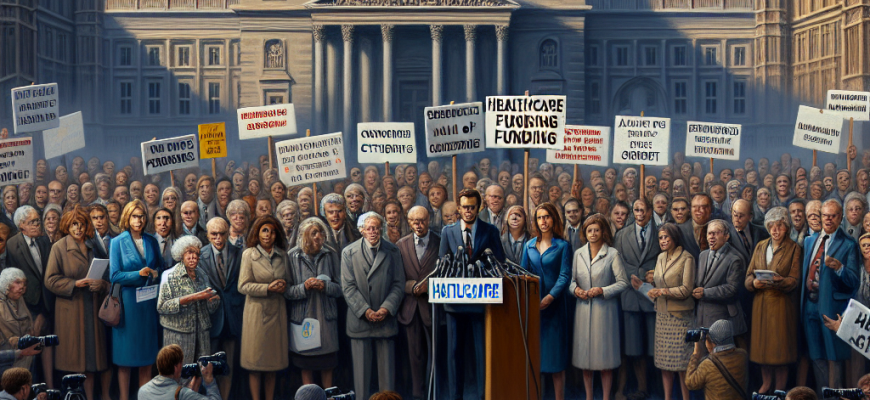- The NHS Funding Crisis: A Tale of Chaos and Complexity
- Financial Shortfalls: The Black Hole of Budget Constraints
- Complex Accounting: The Labyrinth of Lack of Transparency
- Industrial Action: A Storm Brewing in the Healthcare Landscape
- Pressure Cooker: Delivering Services Amidst Efficiency Demands
- Capital Investment and Social Care: A Match Made in Healthcare Heaven
- Government Moves: The Aid Package Promises
- Long-Term Funding Needs: The Future Looms Large
- The Grand Conclusion: Unraveling the NHS Dilemma
The NHS Funding Crisis: A Tale of Chaos and Complexity
Oh, my dear friends, gather ’round as we delve into the swirling tempest that is the UK National Health Service (NHS). The very institution that has cradled the health of millions is now grappling with a funding crisis that raises more questions than a curious toddler in a museum. Yes, the government’s management of this grave predicament has sparked outrage, fierce discussions, and more conspiracy theories than we can shake a stick at. But worry not, for together we shall untangle this web of financial woes without resorting to hair-pulling or melodrama.
Financial Shortfalls: The Black Hole of Budget Constraints
Let’s kick things off with some numbers that would make even a seasoned accountant wince. The NHS England revenue budget for 2024/25 is bracing for a staggering unfunded shortfall of **£4.8 billion**. This titanic gap is primarily caused by overzealous staff pay agreements and other sneaky cost pressures, creeping in like uninvited guests at a party.
- To cushion the blow, our beloved Chancellor would need to whip out the magic wand and announce a real-terms headline increase of at least **3.6%** for the Department of Health and Social Care (DHSC) revenue budget. This would elevate the total to a whopping **£186.4 billion** for the current financial year.
- And while previous in-year transfers from the wider DHSC budget to NHS England were like trying to mend a hole in a leaky boat, the NHS still finds itself awash with a gaping funding gap. Even after the day-to-day budget was nudged upwards from **£165 billion to £179 billion**, the financial abyss remains.
Complex Accounting: The Labyrinth of Lack of Transparency
The financial landscape of the NHS is painted in shades of confusion, littered with complex accounting practices and the ever-shifting definitions of what we deem as NHS spending. What do you get when you cross a funding crisis with a baffling accounting structure? A recipe for disaster, that’s what.
- There is a clamorous demand for financial reporting that plays by the rules of transparency, rather than drawing us all into a convoluted maze where NHS and broader health budgets are treated as separate realms. We need clarity, not confusion!
Industrial Action: A Storm Brewing in the Healthcare Landscape
Ah, the industrial action! The phrase alone conjures images of protest banners, impassioned speeches, and a budgetary black hole sucking the energy out of the NHS. Last year, these actions have racked up costs estimated at a dire **£3 billion**, reflecting on lost income from elective activity that bit the dust faster than a soggy biscuit.
- Two-thirds of respondents from NHS trusts and Integrated Care Boards (ICBs) lamented that further industrial action would throw a spanner into their efficiency targets. It seems this ongoing squabble has taken a toll on waiting lists and, more crucially, the morale of hardworking staff.
Pressure Cooker: Delivering Services Amidst Efficiency Demands
NHS leaders are under relentless pressure to not only deliver services but also to conjure substantial efficiency savings out of thin air. The current financial climate is described as “really difficult,” as if they’ve been asked to perform a magic trick under the brightest spotlight. With pressure mounting, the need for efficiency savings feels like trying to catch smoke with bare hands.
- In the realm of primary care, just over half of the leaders express doubt about meeting their contracted service requirements—yes, **57%** to be precise. This isn’t just a hiccup; it’s a full-blown crisis echoing through NHS organizations across the nation.
Capital Investment and Social Care: A Match Made in Healthcare Heaven
Now let’s discuss the interplay between capital investment and social care needs. It’s a topic worthy of its own soap opera. Over sixty percent of ICBs and NHS trusts report that they can’t hit their current targets without a hefty dose of capital investment. To add fuel to the fire, a staggering **over 80%** assert that social care funding must see a notable increase.
- The NHS Confederation has thrown down the gauntlet, advocating for an extra **£6.4 billion per year** in the NHS capital budget. They also remind us of the urgent need for a long-term workforce plan for social care, lest we want the fabric of our healthcare system to unravel.
Government Moves: The Aid Package Promises
Our dear government has announced a slew of funding measures, perhaps as a way to salvage their reputation in the eyes of the public. Under the auspices of the Autumn Budget 2024, a generous **£25.7 billion** has been earmarked for the NHS over the next two years—the largest increase since 2010, excluding those challenging COVID-19 years.
- This newfound funding aims to tackle waiting times, as it seeks to deliver an extra **40,000 elective appointments** per week. Additionally, there are plans for surgical hubs that could shine a light on increased capacity for procedures and diagnostics.
Long-Term Funding Needs: The Future Looms Large
Yet amid this flurry of short-term measures, long-term funding needs cast an ominous shadow over the NHS landscape. According to the Institute for Fiscal Studies, we require NHS budget increases of around **3.6%** annually in real terms just to meet the commitments carved out in the Long-Term Workforce Plan.
- And let’s not forget the British Medical Association harking on about how health budgets have been eroded by inflation. Real-terms cuts over the years have countered spending boosts during COVID-19, and the modest budget growth for 2024/25 falls woefully short of addressing the spiraling crisis of waiting lists and our aging population.
The Grand Conclusion: Unraveling the NHS Dilemma
So, what is the takeaway here, dear friends? The NHS funding crisis is a many-faced beast that demands an array of solutions—none of which can come from hastily scribbled notes or political posturing. We need a comprehensive, sustainable strategy, one that recognizes the complexity and urgency of this situation.
To navigate this storm, we must focus on:
- Transparent Financial Reporting: Let’s toss out the old accounting malarkey and put forth a coherent reflection of NHS spending.
- Adequate Funding: Real-terms budget increases are a must to tackle the ballooning costs and burgeoning demand that plague our health system.
- Capital Investment: Infrastructure and service delivery need a cash infusion to bring them up to speed.
- Social Care Funding: Attention to social care is non-negotiable if we want a healthcare system that functions holistically.
- Workforce Planning: Aligning short-term financial goals with long-term workforce strategies will ensure that our healthcare goliath remains sustainable.
Only then, through a collaborative and far-sighted approach, can we hope to equip the NHS to meet the healthcare needs of our population without crumbling under pressure. Now, isn’t that a worthwhile goal for us all?









